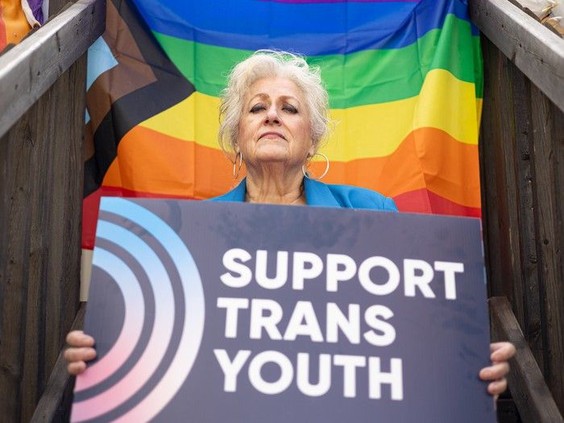
Alec Salloum
Regina Leader-Post
Fran Forsberg wants to know why Saskatchewan Party Leader Scott Moe’s first order of business if re-elected premier would be to bring in a policy on change rooms in schools.
“Why is this an issue?” she asked on Friday morning from Saskatoon. “Surely there are other things.”
Moe announced that such a policy would be priority No. 1 for his party in response to a recent complaint that “biological males” changed for gym class with girls at an elementary school in southeast Saskatchewan.
Forsberg has adopted eight children, two of whom are gender non-conforming. She was part of a court challenge that removed gender markers from birth certificates in Saskatchewan and, with this latest campaign promise, she sees difficulties ahead for young trans people in the province.
“It’s setting people up for discrimination; it puts those kids at risk,” she said. “I cannot tell you how many kids that I talk to, especially now, that don’t have safe places at home.”
In an emailed statement, Moe said this was about supporting students in the province.
“The answer is to accommodate that student by providing a safe space for them to change,” his statement began. “This is not all that different from individualized washrooms we see in schools where anyone can use them.
“There’s a common-sense solution here and we would encourage (school) divisions to act on that. However, if they don’t, a re-elected Saskatchewan Party government will.”
As the identities of students who used the change room became known online, Moe said “The identity of individual minors should never be a part of any political debate.”
When asked how the policy would be enforced and whether it would follow the Canadian Charter of Rights and Freedoms, the Canadian Human Rights Act and the Saskatchewan Human Rights Code, a communications person with the party said “the policy has not yet been developed.” Forsberg believes the uncertainty around what the policy would look like and what it means for students does raise concerns. As for students potentially using individualized washrooms to change, Forsberg said it could “put a target on that kid’s back. All of us should be using the washroom or the change room that we identify with.”

